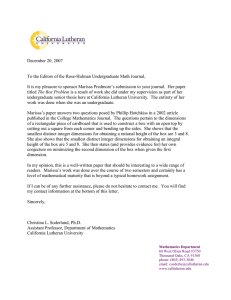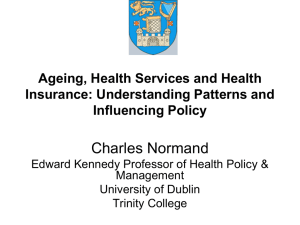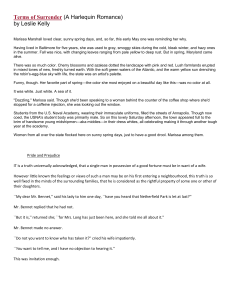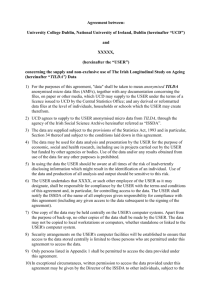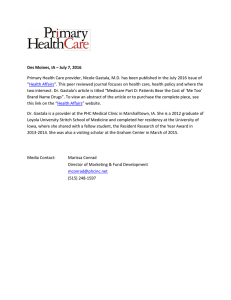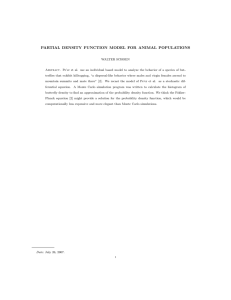Teachers Resource Kit, Synopsis and Lesson Plans
advertisement
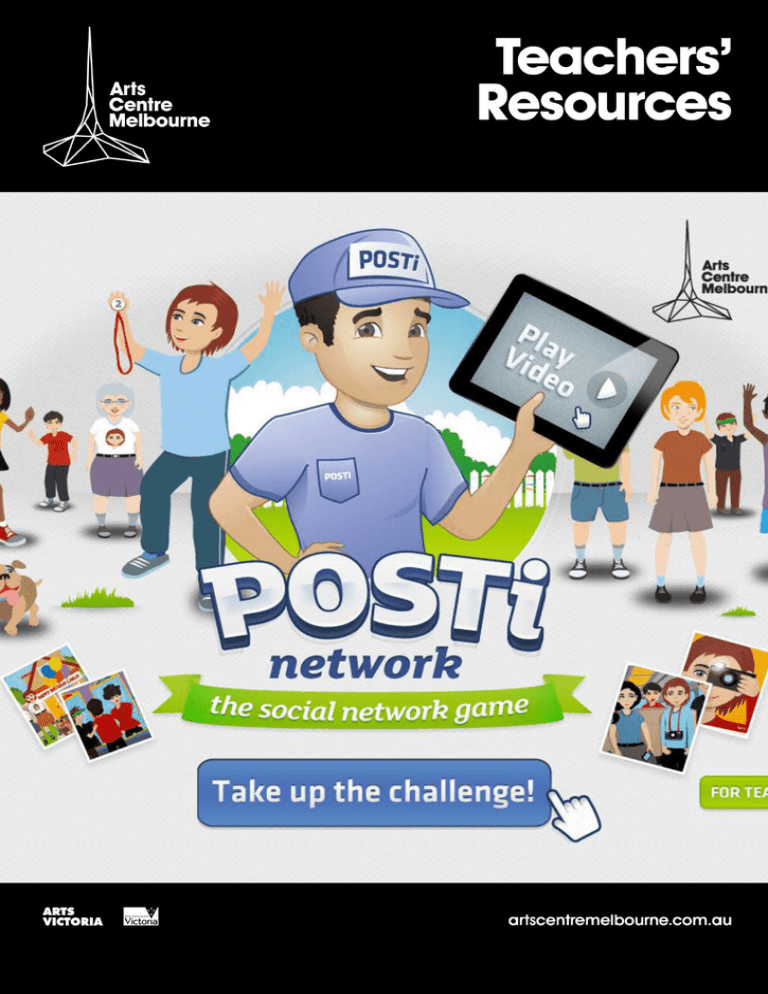
POSTi POSTi Network is an innovative digital educational resource for upper primary students (and teachers) designed to raise awareness about the implications of inhabiting the cyber environment. Part game, part performance, its aim is to prepare young users of cyberspace with a shared awareness about one's place and responsibility as a digital citizen – in particular, online behaviour and relationships. To make POSTi an authentic experience, the play has many of the features of online social networks. To help engage students, it operates like a game where students navigate the site to discover information and evaluate the story. Students progress through the play chronologically in chapters, and are required to answer questions (challenges) correctly before proceeding. For correct answers students are awarded points. For incorrect answers they lose points. Challenges are designed to help students access the story but also think about key learning aspects of behaving respectfully within the digital space. These Teachers’ Resources contain a summary of the POSTi Network. They are broken into chronological story chapters and include: Key chapter themes A synopsis of the chapter A list of all challenges students must answer in order to complete the chapter Suggestions for follow up discussions offline Themes and Discussion Questions: Each chapter tends to have one or more themes. Teachers may choose to interrupt students between chapters to discuss the themes. This will enable students who have become lost, to find their way. It will also enable students to fully explore the issues that are raised in POSTi. Teachers should feel free to pursue the themes they believe are most relevant to the children in their class. VELS Information on how POSTi Network aligns with the Victorian Essential Learning Standards can be found in Appendix 1 on page 22. A glossary of unique terms used on the POSTI Network can be found in Appendix 2 on page 26. POSTi Network was developed by Arts Centre Melbourne and generously supported by the Victorian Government as part of the digital education content initiatives and strategies of the Department of Education and Early Childhood Development. Further assistance was given through the Telematics Trust. 2 Chapter 1: The Slacks Slag Off Key Themes Trust, Friendship, Influence, Rumour, Peer Pressure Synopsis Kerryn, the leader of The Slacks, makes a comment about another girl from school, Kristy, who Kerryn saw going to a cheap clothing store with her mother. Kerryn tells the others that there must be something wrong with Kristy if she buys her clothes there and convinces Lucy not to invite Kristy to her birthday party. Tilda tries to find out more about Kristy to see if maybe her family needs support. Tilda’s friend Ant tells her that Kerryn just makes up stuff like that and shouldn’t trusted. Challenges Question Answer Can you find the name of Tilda's group? 3. The Slacks. Did Frisbo just call Ant a ‘Cumulonimbus Head’? Did 1. A friendly joke. he mean that as... Apart from Tilda, who else is in the Slacks? 4. Kerryn, Tanya & Lucy. One of the Slacks has a fair bit of influence over the 2. Kerryn. others. Why did you choose Kerryn? 1. Lucy changes her mind about inviting Kristy to her birthday party because of what Kerryn says. ...when somebody’s saying mean things about 3. Tell the person to stop saying mean things. somebody else, what can you do about it? or 4. Find something positive to say about the person they’re being mean to. ...I’d be really interested in what advice he gives her? 1. He reckons Kerryn makes stuff up and that Tilda shouldn't trust her. Can you find any evidence that Kerryn made stuff up 3. Kristy’s brother told Ant that what Kerryn said wasn’t about Kristy? true. How do you tell if someone’s telling lies? 4. Get them to back up what they’ve said with evidence. 3 Suggested Offline Discussion Topics ● Who has the most influence over the others in The Slacks? ● Who are the people that influence you in your life? ● Think of a time when you have resisted being influenced by others. What happened? ● Explain whether it was difficult to resist being influenced. 4 Chapter 2: Lucy’s Birthday Key Themes Personal Conviction, Double Standards, Trust, Friendship, Influence, Peer Pressure Synopsis Lucy has her birthday party. Kerryn tells her it was a great party but, in a different message to another girl, says the party wasn’t any good. Lucy finds out what Kerryn said and feels betrayed. Challenges Question Answer On Lucy’s POSTi-profile, Kerryn says her party was the best ever. Does 2. No. she say the same thing on Tanya’s POSTi-profile? I bet Lucy would be upset if she knew that Kerryn didn’t like her party. 2. Yes, she did find out. She read it There’s no way she could find out is there? on Tanya’s POSTi-profile. How did Lucy feel when Kerryn said her party was unslackworthy? 2. She was hurt. What should Lucy do to stop Kerryn from talking behind her back? 1. Talk to Kerryn about it. Suggested Offline Discussion Topics ● Who is being two-faced about Lucy’s party? ● How do people feel when friends criticise them behind their back? 5 Chapter 3: The Rumour Key Themes Friendship, Rumour and Gossip, Self Esteem, Independence, Self Conviction Synopsis Despite Kerryn saying The Slacks shouldn’t go in the school sports, Tilda enters the relay race and wins. Carlo comes in second to his hero, Frisbo in the Triple Jump and brags about it to all his friends. At school, Carlo gets paired up with Tilda for a group assignment. Carlo has a big crush on Tilda and his friends give him a hard time about it. Kerryn thinks that Carlo is a dork and makes fun of Tilda for having to work with him, but Tilda thinks he’s okay. Kerryn spreads a rumour about Tilda and Carlo being girlfriend and boyfriend and tells everyone that Tilda is twotiming him. Tilda finds out what Kerryn has said and decides not to be part of The Slacks anymore. Challenges Question Answer Did you work out that Angelo’s plan is to do more bike riding? 4. To save his bus money and buy the new X-Boy I can’t work out why. Can you? console. How does all this riding his bike to school make Angelo feel? 2. Strong. Why is Angelo keeping his plan a secret from his mum? 1. He doesn’t want to lose his bus fare. Carlo seems excited about being in a group project at school. 1. Tilda. Do you know who else is in the group? Carlo seems excited about being in a group project at school. 1. They crack jokes about it. Do you know who else is in the group? How does Carlo respond to their joking around? 1. He cracks jokes back at them. or 4. He tells them to stop it. I missed what Kerryn said about Tilda being friends with Carlo 2. She said mean things about Carlo. on Lucy's POSTi Profile. Can you tell me how she reacted? Did she really say mean things about Carlo? What’s your 1. She said Carlo was a dorkasaurus when she evidence? doesn’t even know him. Or 4. She says Carlo isn’t as slackworthy as Frisbo. 6 So how did Tilda respond to Kerryn calling Carlo a 1. She told Kerryn that she shouldn’t say things dorkasaurus? about people when she doesn’t even know them. Looks like someone’s spreading rumours about Tilda. Who 4. Kerryn. does Tilda think started the rumour? What evidence do we have that Tilda thinks it might have 3. Because Tilda says she reckons it’s Kerryn. been Kerryn who started the rumour? So Tilda thinks Kerryn started the rumour. What does she do 2. She dumps Kerryn and Lucy and Tanya and about it? leaves The Slacks. Why doesn’t Tilda just confront Kerryn if she thinks she’s 3. She thinks Kerryn would just deny it. spreading rumours? Why did Tilda dump The Slacks? 3. She doesn’t like being part of that group anymore Why might Tilda feel that she did the right thing by dumping 1. Because she doesn’t trust them The Slacks? or 2. Because they were being mean What did Tilda do after dumping The Slacks? 3. Asked Carlo to be her POSTi-pal. Suggested Offline Discussion Topics ● What is the rumour? ● What is the reason Tilda breaks with The Slacks? ● Do you find that some people tend to exaggerate their stories? ● What might be a reason that people sometimes pretend to believe stories that deep down, they think are untrue? 7 Chapter 4: The Suspicious Character Key Themes Trust, Privacy, Online Safety, Consequences, Punishment Synopsis Rory accepts the offer of a free deal on the Internet and discovers that his personal details are now available to anyone. Leon has found Rory’s details online and makes friends with him. Rory ignores the indicators that suggest Leon might not be trustworthy and willingly shares lots of information with him. Meanwhile, Ant shows Frisbo how to disable NetNanny and they subscribe to an inappropriate website. Ant’s parents ban him from using the Internet for two weeks. Challenges Question Answer Did you work out who was behaving suspiciously? 3. Leon. Rory’s just been offered a special ticket deal on FREE MUSIC 2. No. It sounds a bit suss. DOWLOADS. Whatd’you reckon? Should he sign up for it? Ant’s parents just banned him from using the internet. Do you know the 2. Because he subscribed to a reason? Take a look at both Ant and Frisbo's POSTi-profiles to find out website they didn’t approve of. why. or 3. Because he disabled the NetNanny. I think I’d like to send Carlo a birthday card but I don’t know his address. I 2. Yes, it’s 17 Privett Street. don’t suppose you can you find out what it is? Did you work out which one of Flick’s friends is feeling down in the dumps? 2. Marissa. Does Flick try and do anything about Marissa feeling sad? 3. Yes, she asks other friends if they know what’s wrong with Marissa. What are some other examples you’ve seen in the POSTi Network of 3. When Ant warns Tilda about friends taking care of each other. Kerryn. or 8 4. When Tilda tries to find out if Kristy’s alright. Angelo and Flick keep cracking jokes about the Gamers. Is this another 3. Rory, Carlo, Angelo. group I don’t know about? Who are they? Suggested Offline Discussion Topics ● What are some clues that Leon is behaving suspiciously? ● What are the reasons a person needs to be careful when chatting online? ● How are some of the ways a person can protect their privacy when chatting online? ● What did Ant do to get himself banned from the Internet? ● What is the purpose of Net Nanny? ● What do young people need to be careful about when they are on the Internet? 9 Chapter 5: The New Girl Key Themes Identity, Friendship, Loneliness, Communication, Change, Loss, Support Synopsis Marissa is the new girl at school. She finds it hard to make new friends and misses her old school. Tilda and Carlo decide to invite her into their group for the assignment they’re working on. Kerryn makes rude comments about Marissa to The Slacks and Frisbo makes a joke about her to Ant who tells him that Tilda thinks she’s okay. Frisbo makes a joke about Ant being in love with Tilda. Challenges Question Answer So how’d you go, Super Sleuth? Did you find out who the 3. Marissa. new kid is? How’s she fitting in? Is there anything on Marissa’s POSTi- 2. A bit sad and lonely. profile that would give you a clue to how she feels? How do you know that she feels sad and lonely? Got any 3. She tells her friends from her old school that evidence? she’s homesick and hasn’t made any friends yet. Suggested Offline Discussion Topics ● Who is Marissa? How is she feeling? Who tries to help her? ● Think of a time when you helped somebody. What happened? How did you feel? 10 Chapter 6: Scienceworks Key Themes Friendship, Peer Pressure, Privacy, Influence Synopsis The class goes on an excursion to Scienceworks. Carlo is excited about sitting next to Tilda on the bus. He and Tilda and Marissa hang out together all day and have a good time. Carlo brings the camera he got for his birthday and takes lots of photos, including some of Frisbo racing a ‘virtual Cathy Freeman’ and some of all the kids clowning around at the distorting mirrors. After the excursion, Frisbo contacts Carlo and asks for a copy of the photo Carlo took of him. In an effort to impress Frisbo, Carlo uploads all the photos he took. Meanwhile, Rory’s online friendship with Leon continues. Rory still doesn’t pick up on the cues that should make him suspicious. Challenges Question Answer Who did Carlo end up sitting with on the bus? 2. Tilda and Marissa. Who did Kerryn hang out with? 1. Kristy. How did Frisbo go in the Cathy Freeman race? 2. He won! Did Marissa have a good time? 2. Yes, she thought it’d be boring but it turned out to be fun Which one of The Slacks is also having second thoughts about being in the 2. Lucy. group? What’s Ant’s favourite part of ScienceWorks? 2. The lightning room Who’s replaced Tilda in The Slacks? 2. Kristy. So what do you think about this Leon dude? Suss or not? Should Rory go to the 1. NO – He’s a bit suss. I’d be Fleetwood Mac concert with him? careful if I was Rory. or 3. NO - He’s really suss. I don’t think he’s who he says he is. 11 What makes you think Leon’s suss? Is there any evidence? 4. He asks lots of personal questions. Did you see Carlo’s photos on POSTi-pix? There’s also one of Flick in her 2. He think’s Frisbo is cool and scarecrow costume. Pretty funny. But I wonder if Carlo has posted more pics wants to be his friend. than he should have. Frisbo only asked for one photo. Why do you think Carlo posted so many? How do you know Carlo thinks Frisbo’s cool and wants to be his friend? 2. After the sports day, Carlo posted that he thought it’d be cool to be a hero like Frisbo. Carlo’s photos are of himself, Frisbo, Tilda, Marissa, Lucy, Ant. Is it okay that he 2. Maybe Carlo should have put photos of them all onto POSTi-pix? asked the other people in the photos first. or 4. You should always respect other people’s privacy when you’re posting photos online. Suggested Offline Discussion Topics ● What were the highlights of the excursion to Scienceworks? ● What is the best excursion you have been on with the school or your family? ● What makes excursions so much fun? ● What makes you think that Rory should be suspicious of Leon? ● If you were Rory, what would you do? 12 Chapter 7: The Photo Key Themes Privacy, Friendship, Trust, Support, Online Safety, Public Domain, Communication, Ethical Behaviour. Synopsis Frisbo finds a photo of Marissa, the new girl, looking fat in the distorting mirrors at Scienceworks. He and Ant send it back and forth to each other, drawing facial hair on it and writing mean captions underneath. Against Ant’s wishes, Frisbo sends the photo to Kerryn who sends it to The Slacks and pretty soon the image of ‘The Hairy Boombah’ is circulating uncontrolled on the Internet. Before too long, everyone except Marissa has seen it, even some of her friends from her old school. Tilda gets really angry about the photo and blames Carlo. In trying to impress Frisbo, Carlo has let down Tilda and Marissa and now he’s paying the price. Meanwhile, Lucy doesn’t like what Kerryn says about Marissa and the photo. She decides to leave The Slacks and tries to make friends with Tilda and Marissa. Challenges Question Answer Did you check everyone out? Who thinks 1. Frisbo. that the photo of Marissa is funny? or 2. Ant. or 3. Kerryn or 4. Tanya or 6. Angelo Did you check everyone out? Who thinks 4. Some people who thought it was funny sent it to their friends, and that the photo of Marissa is funny? some of them sent it to their friends and pretty soon lots of people were sending it around. Someone had a big argument about 1. Ant and Frisbo whether it was funny or not. Can you tell or me who that was? 2. Lucy and Kerryn or 4. Carlo and Frisbo 13 What did Lucy do about the photo? 2. Dogwhistled The Slacks because she was sick of them being mean. How does Carlo feel about what Frisbo and 2. He's pretty upset. Ant did to his photo? But didn’t Carlo tell Frisbo that he thought it 3. Yes, but he didn’t mean it. He was just trying to stay in Frisbo’s was funny? good books. What makes you think Carlo is upset about 1. He gets angry at Angelo for thinking it’s funny. it? or 2. Because Tilda gets angry at him about it. What does Carlo do about what Frisbo and 3. Says he's deleting the photo from POSTi-pix. Ant did to his photo? What does Tilda do about the photo? 1. She tells off Ant and Carlo. How does Ant feel about the photo? 3. He really regrets doing it. or 4. He tells Frisbo to delete it. What makes you think that Ant might regret 3. He tells Frisbo that the joke’s over and that they should both having made the photo? delete the photo and not send it around. Suggested Offline Discussion Topics Many themes are relevant to this chapter: ● Privacy: discuss whether it is possible to have a private conversation on the Internet? ● Public domain: what is meant by the term, ‘public domain’. How is this term relevant to the Internet? ● Online communication: how is talking to someone online, different from having a face to face conversation? Ethical behaviour: choose some of the central characters, Frisbo, Tilda, Kerryn. Discuss: ● How did they behave in the incident? ● What might be the reason for how they behaved? 14 Chapter 8: The Aftermath Key Themes Friendship, Empathy, Betrayal, Support, Privacy, Family Synopsis The business with the photo ends up having a detrimental effect on lots of friendships, especially Ant and Frisbo, Tilda and Carlo, Tilda and Ant, Marissa and her old school friends. Marissa is miserable and humiliated about the whole thing, but hasn't told her mum about it; only her sister. On the brighter side, Marissa discovers that as well as support from her sister, she has support from Tilda and makes a new friend in Lucy. Challenges Question Answer Who’s this Leila that Marissa’s talking to? 3. Marissa’s sister. That photo of Marissa seems to be having a bit of an impact 1. Ant and Tilda. on a few friendships. Whose friendships are affected? or 2. Ant and Frisbo. or 3. Flick, Anja and Marissa. or 4. All of the above. What makes you say these friendships were affected? Is 1. Tilda stops replying to Ant’s posts. there any evidence? or 2. Ant tells Frisbo he’s too busy to hang out with him. or 3. Flick and Anja chicken out of offering Marissa their support. or 4. All of the above. How is Marissa feeling about the photo? 3. She’s angry and upset about it, but she doesn’t want to talk to anyone. What makes you think she doesn’t want to talk to anyone? 1. Leila is worried that she hasn’t heard from Marissa. or 15 2. Marissa tells Leila she hasn’t spoken to her mum about it. or 3. Marissa says she doesn’t want to go back to school. She doesn’t want to talk to anyone about it. or 4. All of the above. Apart from her sister Leila, does Marissa have any support 3. Yes, Lucy contacts her to say she and Tilda want from friends? to help. What else could you do to support Marissa? 1. Offer to go with her to see the school principal. or 2. Offer your support. Be a shoulder to cry on. or 3. Make it clear to everyone that you don’t support what Frisbo and Ant did. or 4. All of the above. Suggested Offline Discussion Topics ● How were people affected by the photo of Marissa? 16 Chapter 9: Creepy Leon Key Themes Privacy, Trust, Online Safety Synopsis Rory’s friends, Carlo and Angelo are getting suspicious about Leon who is trying to make an arrangement to meet Rory in person. Eventually, Rory realises that he’s revealed a lot of personal information to a complete stranger and might have put himself in danger. Rory decides not to be friends with Leon anymore. Challenges Question Answer Rory just uploaded a photo of himself in his school 3. Could be, if Leon is up to no good. Now he’ll be able uniform because Leon asked him to. Is there any risk in to work out what school Rory goes to. that? or 4. Yes. You should always be careful about how much personal information you post. Do you think Leon’s a bit creepy? 4. Yes, because he used the photo of Rory in his uniform and Google-Earth to track him down. That’s weird. How do you think Rory might be feeling about this? 1. He’s getting a bit suspicious about Leon now. What makes you think Rory is getting suspicious? 3. Rory tells Leon he’s behaving like a stalker. What could Rory do to keep himself safe? 1. DogWhistle Leon and stop being his POSTi-pal. Suggested Offline Discussion Topics ● How do you think Rory is feeling about Leon? ● What is making him feel like that? ● What are some of the risks for Rory when talking to Leon? ● How can a person protect their privacy (and safety) online? 17 Chapter 10: Making Things Right Key Themes Responsibility, Friendship, Trust, Forgiveness Synopsis Ant feels bad about what he and Frisbo did, but won’t talk to his parents about it because last time he did something naughty on the Internet he got banned from using it. He manages to talk to Tilda, even though he knows she’s still made at him. Carlo also feels bad about what he did. He tries to apologise to Tilda but she tells him he should be apologising to Marissa. He does, and Marissa accepts his apology. Challenges Question Answer Why have Flick and Anja avoided contacting Marissa about the photo? 1. They don’t like talking to friends about bad news. or 3. They didn't want to hurt her feelings. The longer you leave some things the harder they get. What do you think Flick 4. Just be a friend and talk to should do about Marissa? The longer you leave some things the harder they Marissa about it. get. What do you think Flick should do about Marissa? Did you see that someone made an apology on Marissa’s POSTi-profile over 3. Carlo. the business about the photo? About time! Who was it? What do you think made Carlo want to apologise to Marissa? 1. Even though he didn’t deface the photo, he still feels responsible. or 2. He feels bad for being part of something that made Marissa unhappy. or 3. He feels bad that he might have ruined his friendship with Tilda and Marissa. or 4. All of the above. 18 Is there any benefit in apologising for something like this? Does it make any 2. Yes, it makes you and the difference? person you hurt both feel better. Suggested Offline Discussion Topics ● What do people do to care for Marissa? ● Does anything help Marissa to feel better? 19 Chapter 11: Richelle et la Boombahs Key Themes Trust, Privacy, Friendship, Support, Celebrity, Sincerity Synopsis Richelle et la Boombahs is a very popular French band and, to everyone’s surprise, when they release their new album the doctored photo of Marissa is on the cover. Now, Marissa is a bit of a cult hero at school and everyone wants to know her. Some even think that her new-found celebrity makes up for the embarrassment and humiliation of the photo being circulated in the first place. Marissa doesn’t quite know what to make of it all, but it does help her sort out who are her real friends. Things get even stranger, when the band realise that they’ve used an image that they don’t own. They contact Marissa to apologise, and offer her tickets and a backstage pass to their next concert. Marissa takes Tilda and Lucy. Challenges Question Answer Have you looked closely at the cover of the Richelle et la 4. You’re right. It’s that photo of Marissa!!! Boombah’s album. Am I right about who I think that is on there? How did this happen? How did a photo that Carlo took at 3. A member of the band found the photo on Scienceworks in Melbourne end up as the cover of a French Rock the Internet and thought it was okay to use it. Band? How does Marissa feel about the photo being used? 2. Unsure. What might be the reason she’s unsure? 1. She doesn’t like the photo but she does like the band. or 2. She doesn’t know what will happen next. or 3. She doesn't like all the attention. or 4. Possibly any of the above. What are the Boombah’s apologising for on Marissa’s POSTi- 2. Using Marissa’s image without her profile? permission. How are all your POSTi-pals reacting to Marissa’s photo on the 1. They think it’s cool. cover of the Boombahs album? or 20 2. They think Marissa’s famous. Suggested Offline Discussion Topics ● What happened to Marissa’s photo? ● How do people feel about it? ● Does the happy ending change whether you believe people behaved rightly or wrongly? ● Have you ever had an experience that had an unexpected ending? Explain what happened. 21 APPENDIX 1 – Links to Victorian Essential Learning Standards POSTI network has been developed for students at level 4. In this sense, it has been developed for students in years 5 – 7, although it may be used to stimulate discussion with older students. Interpersonal Development - Level 4 Learning focus As students work towards the achievement of Level 4 standards in Interpersonal Development, they develop skills and behaviours for connecting with a variety of groups, including peer and community groups. Students participate in a range of classroom activities where they explore the similarities and differences in the values and beliefs of a range of individuals and groups. They begin to reflect on what this may mean for themselves when building and maintaining relationships with a diverse range of people. They explore and discuss behaviours which demonstrate sensitivity to cultural differences in their interactions with others. Students compare their beliefs and values with others, and consider how these influence feelings and behaviour. Through discussion and activities such as role-play, they reflect on inclusion, belonging and tolerance. They consider how it feels to be excluded from a group. They identify examples of bullying in a range of contexts. They explore the impact of bullying on people’s sense of self-worth and are assisted to identify, discuss and use different strategies to reduce, avoid and resolve bullying. Students begin to recognise and discuss the influence that peers can have on their behaviour and consider response options. Students explore a range of contexts, both within and beyond school, in which individuals are required to work effectively as part of a team. They discuss appropriate knowledge, skills and behaviours in these contexts and the importance of developing these. Working in different teams, students are provided with opportunities to complete tasks of varying length and complexity. In doing so, they learn to identify the characteristics of members in effective teams and to develop descriptions for particular roles such as leader, recorder and participant. Students contribute to the development of and use criteria for evaluating their own and the team’s effectiveness in team work. National Statements of Learning This Learning focus statement incorporates aspects of the National Statements of Learning for Civics and Citizenship, Year 5. 22 Building social relationships Students demonstrate, through their interactions in social situations, respect for a diverse range of people and groups. Students describe the impact of bullying. They accept and display empathy for the points of view and feelings of their peers and others. They identify and use a variety of strategies to manage and resolve conflict. Civics and Citizenship - Level 4 Learning focus As students work towards the achievement of Level 4 standards in Civics and Citizenship, they learn about the origins and establishment of the Australian nation at Federation. They examine the nature of the Australian federal system of governance that developed. They consider the effects of Australian federation on the democratic rights of different groups of people such as Aboriginal and Torres Strait Islander (ATSI) people, women and non-British migrants. Students learn about the three levels of government in Australia and investigate examples of the functions and services of these governments such as currency, defence, education, health, parks and libraries. They examine other features of Australian democracy; for example, the role of government in representing the people, the key tasks of a member of parliament or councillor, how parliament makes laws and the importance of voting. They learn about the values of democracy, and the rights and responsibilities of citizenship. They consider the experiences of diverse cultural groups, including ATSI communities, and their contributions to Australian identity. They consider the values important in a multicultural society such as respect and tolerance. Students learn about the processes of making and changing laws and the role of the courts and police. They consider important principles such as the independence of the judiciary, equality before the law, and the presumption of innocence. They compare Australian legal processes with those of other cultures, such as those of ATSI communities. Students understand that when Australians travel overseas, the laws of other countries apply to them. Students understand the ways in which Australian citizens are influenced by and can influence local, state, national, regional and global decisions and movements, including issues of sustainability. They investigate the social and political links between Australia and other countries in the Asia-Pacific region and explore global developments and their potential impact on Australia. They understand that protecting the environment requires that people work together as citizens and consumers and participate in appropriate actions as environmental stewards or in other civic action to effect positive change. Students research an issue, or issues using a range of resources including electronic media. These could include current local, national and global issues; for example, natural disasters and human rights issues. They consider actual and possible actions by citizens and nations in response to the issue/s. 23 Students explore ways in which they can actively participate in their school and community. They investigate the qualities of leadership through past and present examples. They are provided with opportunities to participate in school events and experience class and school leadership roles and their responsibilities. National Statements of Learning This learning focus statement, with the following elaborations and in conjunction with the Level 4 learning focus statements for Interpersonal Development, Communication, History and Geography, incorporates the Year 5 National Statement of Learning for Civics and Citizenship. Elaborations: Students understand that when Australians travel overseas, the laws of other countries apply to them. Students understand the ways in which Australian citizens are influenced by and can influence local, state, national, regional and global decisions and movements, including issues of sustainability. They investigate the social and political links between Australia and other countries in the Asia-Pacific region and explore global developments and their potential impact on Australia. They understand that protecting the environment requires that people work together as citizens and consumers and participate in appropriate actions as environmental stewards or in other civic action to effect positive change. Community engagement Students present a point of view on a significant current issue or issues and include recommendations about the actions that individuals and governments can take to resolve issues. They demonstrate understanding that there are different viewpoints on an issue, and contribute to group and class decision making. English - Level 4 Learning focus As students work towards the achievement of Level 4 standards in English, they consolidate and build on their foundational learning in English related to texts and language. Students compose, comprehend and respond to an expanding range of texts in print and audiovisual and electronic forms that contain increasingly unfamiliar concepts, themes, information and issues. With guidance, they reflect on reading, viewing, writing, speaking and listening in ways that develop considered and critical approaches to a range of texts. These include extended literary texts such as novels, short stories, poetry and non-fiction; everyday texts; and media texts including newspapers, film and websites. Students explore the relationship between the purpose and audience of texts and their structures and features, for example: sentence and paragraph structure, grammar, figurative language and organising structures in print texts; features of visual texts; and sound effects, characterisation and camera angles used in film. They develop their knowledge of how texts are constructed for particular purposes, and examine and challenge 24 generalisations and simplistic portrayals of people and social and cultural issues. They learn how to draw evidence from texts to support their points of view. They experiment with several strategies when interpreting texts containing some unfamiliar ideas and information, for example, reading on, using diagrams, and differentiating between statements of fact or opinion. Students write texts for a range of purposes that demonstrate their developing understanding of the way imagery, characterisation, dialogue, point of view, plot and setting contribute to the meaning of written and multimodal texts. They use this reflection, and their developing knowledge of the generic structures of different types of texts (such as narratives, reports and arguments), as the basis for composing an increasing range of written and spoken texts. Students become more systematic in their use of strategies for writing (including note-making, using models, planning, editing and proofreading) and make decisions about appropriate structures and features of language in texts for different purposes and audiences. They develop terminology or metalanguage to talk about and describe particular structures and features of language. They develop a multi-strategy approach to spelling, applying morphemic knowledge and an understanding of visual and phonic patterns, and select vocabulary for precise meaning. Students engage in exploratory talk to share and clarify their ideas, to formulate simple arguments and to seek the opinions of others. They participate in oral interactions for different purposes, including entertaining, informing and influencing others. Students learn to sustain a point of view, and provide succinct accounts of personal experiences or events. They experiment with spoken language features such as pace, pitch and pronunciation to enhance meaning as they plan, rehearse and reflect on their presentations. They build their capacity to combine verbal and visual elements in texts to communicate ideas and information by using, for example, presentation software or overheads. When listening, students practise identifying the main idea and supporting details of spoken texts and summarising them for others. They begin to identify opinions offered by others, propose other viewpoints, and extend ideas in a constructive manner. National Statements of Learning This learning focus statement, in conjunction with aspects of the Communication Level 4 learning focus statement, incorporates aspects of the Year 5 National Statement of Learning for English. Reading Students read, interpret and respond to a wide range of literary, everyday and media texts in print and in multimodal formats. They analyse these texts and support interpretations with evidence drawn from the text. They describe how texts are constructed for particular purposes, and identify how sociocultural values, attitudes and beliefs are presented in texts. 25 APPENDIX 2 – POSTi GLOSSARY OF TERMS POSTi - A friendly postman character who pops up on-screen throughout the game offering useful tips, advice and educational content. POST-pals - Fictional characters within the POSTi Network whose chats, messages, photos and updates contain both the narrative and key educational content. Students gain POSTi-pals by accepting friend requests which appear onscreen throughout the game. POSTi-profiles - Each fictional character has their own POSTi-profile page. These can be accessed by clicking on the relevant character's POSTi-profile photo. Students are only able to see content on POSTi-profiles of characters they have already added as POSTi-pals within the game. Your Profile - Students can return to their own profile page by selecting the "Back to your profile" link shown on the right side of the screen. Student profile pages contain: Any content uploaded by students (such as their name and profile photo) Pending challenges Pending friend requests A list of all successfully completed challenges A list of fictional characters already added as friends within the game. Challenges - Multiple choice questions which must be answered to progress through the game. POSTi-points - Students gain points for successfully completing challenges. There are 1000 points available throughout the game. A student answering all challenges correctly will gain the full 1000 available points. The points system: Accepting a friend request : 5 points Correctly answering a challenge: 10 points Incorrectly answering a challenge: -5 points. Chapters - There are 11 chapters of varied length to be completed throughout the game. Time Skip - Time skips are jumps which occur between chapters. When the final challenge within a chapter is completed a Time Skip animation will appear on screen for 5 seconds before the next chapter begins. Time skips move the narrative along by several hours, days or weeks. When a new chapter begins, new content is added on all character profiles across the POSTi network. Older content is moved down POSTi-profile pages and into the history of content posted by that character. POSTi-preferred - The equivalent of a Facebook "Like". In the POSTi world fictional characters "POSTi-preferred" things they like such as bands etc. Live Feed - An area of the screen containing a regularly updated list of content as it is posted live by fictional characters within the game. 26
